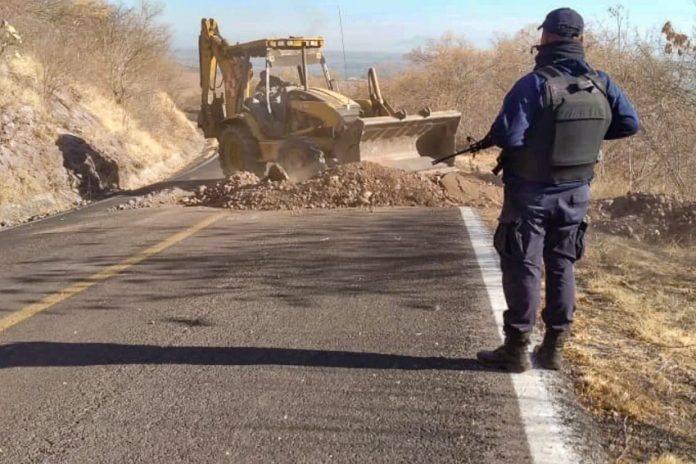Michoacán police carried out an operation early Monday to clear highway blockades set up by a criminal organization in the violence-stricken municipality of Aguililla.
The state Public Security Ministry (SSP) said police reopened the Apatzingán-Aguililla highway, which had been blocked by the Cárteles Unidos, a criminal group engaged in a vicious turf war with the Jalisco New Generation Cartel (CJNG).
The ministry said on Twitter that seven locations on the highway that were blocked with stones, trenches and vehicles were reopened. One hundred police officers were deployed to “reestablish basic services to Aguililla,” which has been cut off by blockades for at least four months, it said.
The state police “will provide security together with federal authorities to guarantee that the supply of medications and fuels and the transport of goods is normalized,” the SSP said.
Michoacán Security Minister Israel Patrón Reyes led Monday’s operation, which was ordered by Governor Silvano Aureoles.
According to residents who spoke with the newspaper Reforma, the Cárteles Unidos set up the blockades to stop further CJNG incursions into Aguililla.
The CJNG, a powerful criminal organization seeking to expand its influence in Michoacán and other states, already appears to hold significant sway in the municipality, where it massacred at least eight and as many as 27 Cárteles Unidos members in late March.
Aureoles acknowledged last week that the city was being held hostage by the two feuding criminal organizations.
The blockades created shortages of essential products such as food, medicines and gasoline and forced prices up. Residents complained that they couldn’t access health and financial services.
Some families have fled Aguililla due to the ongoing threat of violence and difficulty in accessing essential goods and services.
The root cause of the violence, the blockades and the shortages is that both the CJNG and the Cárteles Unidos want to control the production of synthetic drugs in Aguililla and trafficking routes running through the municipality, the Michoacán governor said last week.
“This region has a decades-long history of the cultivation of illicit plants but now … [the main activity] is the production of synthetic drugs” such as fentanyl, Aureoles said.
Chemical precursors — many of which are shipped to Pacific coast ports from Asian countries — come into Aguililla, he said, and manufactured synthetic drugs go out.
Source: El Universal (sp), Reforma (sp)
